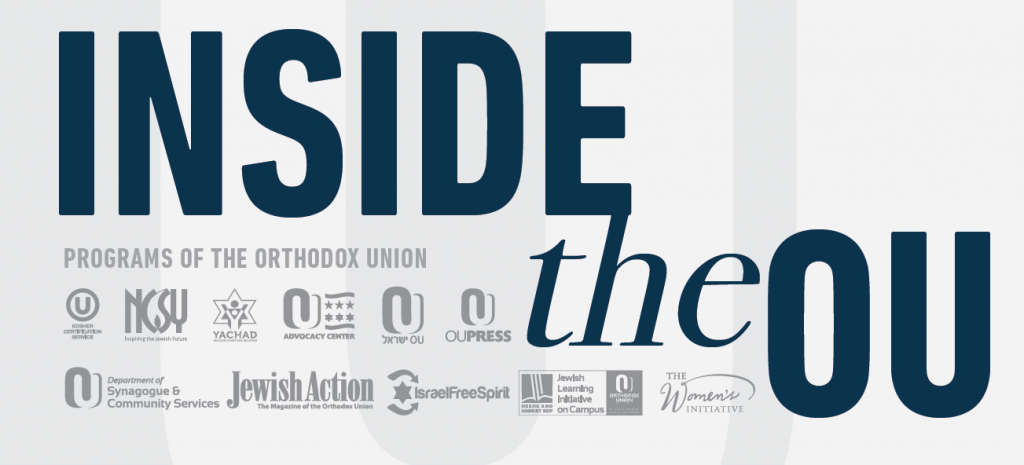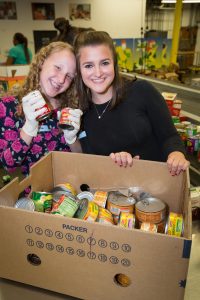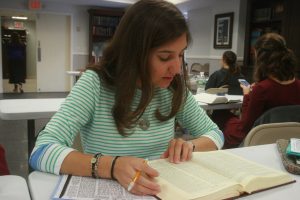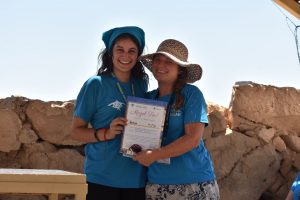Inside the OU – Winter 2018
HAPPENINGS AROUND THE OU
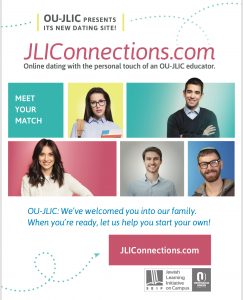 Dating Site for OU-JLIC Students & Alumni
Dating Site for OU-JLIC Students & Alumni
This summer OU-JLIC launched a dating web site for students and alumni: JLIConnections.com. The initiative was spearheaded by Rabbi Reuven and Shira Boshnack, OU-JLIC Educators at Brooklyn College, who saw the need for a dating platform where OU-JLIC’s constituents would be comfortable. What does JLIConnections offer that other Jewish dating sites don’t? “The personal touch,” explains Rabbi Boshnack. “Our students are set up by matchmakers—OU-JLIC Educators—who really know each individual.” OU-JLIC operates on twenty-one college campuses and serves nearly 4,500 students a year. To sign up, visit jliconnections.com >
NCSY’s newest summer program, GIVE East, is a four-week-long, all-girls program that helps teens learn the value of chesed and social action in a fun and wholesome environment. While traveling across the Southeast USA, post-seventh and eighth grade girls will engage in hands-on chesed—preparing and distributing food at soup kitchens, interacting with the elderly, creating a carnival for the developmentally disabled, and so much more. Learn more at giveeast.ncsy.org.
1600+ teens participated in 18 NCSY summer programs this past year.
To register for any of NCSY’s summer programs, visit summer.ncsy.org
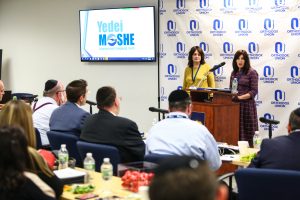
Social entrepreneurs Rivka Ariel (right) and Yael Wedeck pitch their program—Yedei Moshe—to the Accelerator Board this past September. Yedei Moshe places teenagers for whom the traditional school environment does not work in meaningful jobs that teach responsibility and respect.
OU Impact Accelerator Announces Winners!
The OU Impact Accelerator, a six-month program built on mentorship-based growth and early-stage funding for Jewish nonprofit entrepreneurs, announced its first cohort! During September’s pitch night at the OU Headquarters in New York, twelve semi-finalist ventures, originating from fifty-seven applicants, pitched their nonprofits to the Accelerator Board, OU senior leadership, and each other. After careful deliberation, in October the Accelerator Board selected the following six winners for the 2018-2019 Cohort:
“The OU Impact Accelerator’s vision is to serve as a hub for Jewish innovation within the Orthodox world.”
– Jenna Beltser, Founding Director
NechamaComfort supports families who have suffered miscarriage, stillbirth or infant loss. Services include immediate help at the time of the loss, and ongoing individual, family and group support.
GrowTorah develops educational Torah garden programs for Jewish schools and communal organizations, incubating emunah, environmental stewardship, compassion for creatures and tzedakah.
Yedei Moshe places teenagers for whom the traditional school environment does not suit in meaningful jobs that teach responsibility and respect. By learning a trade, teens build confidence and skills.
Imadi provides advocates to families struggling with mental illness to ensure basic needs, such as meals, carpools and childcare, are met. Imadi helps establish functionality in homes that are suffering due to mental illness.
The Young Talent Initiative (YTI) channels the creativity of young men ages sixteen to twenty-one through professional music training, teaching them how creativity can enhance all aspects of their lives.
TorahAnytime records Torah lectures given around the world and uploads the footage to its web site, enabling viewers around the globe to watch or listen, free of charge. This online Torah resource for the busy adult aggregates Torah shiurim through various digital platforms.
College Student Launches Women’s Beit Midrash
What began as a WhatsApp group of like-minded friends developed into an intensive summer learning program for college-age women.
This past summer, Yavneh guided a group of students in launching the Bnot Sinai Women’s Beit Midrash. Yavneh, a Jewish student leadership initiative dedicated to strengthening Jewish leadership on campuses around the world, is a partnership between OU-JLIC and Mizrachi. Guided by skilled Torah Educators, including the Founding Director of OU-JLIC Rabbi Menachem Schrader, local yeshivah day school educators, and alumnae of YU’s Graduate Program for Advanced Talmudic Study (GPATS), the Yavneh student leaders embarked on an intense two-week Beit Midrash program where they studied Tanach, Gemara, halachah and Jewish philosophy at the Young Israel of North Woodmere.
Who brought this all together? A twenty-year-old junior at Stern College for Women in New York named Tamar Beer. In the fall of 2017, Tamar was finishing Shana Bet at Midreshet Lindenbaum in Israel. She dreamed of creating a place where young women could continue high-level Torah study after their year in Israel. So she created a WhatsApp group chat as a way of crowd-sourcing other young women interested in advanced Torah study.
“Though there is an endless supply of high-level shiurim available online, it’s often difficult to focus and remain persistent when you feel like you are learning alone,” says Bnot Sinai participant Rachel Fried, who currently attends Stern College.
Devora Chait, a Yavneh Fellow at Queens College in New York, connected Tamar to Rabbi Jonathan Shulman, Director of Yavneh and OU-JLIC in Israel, to see if Yavneh could help bring Bnot Sinai Women’s Beit Midrash from a dream to reality. The answer was a resounding yes.
“This is what Yavneh does—identify, train and support great student leaders who want to dream and create,” says Rabbi Shulman.
At Yavneh’s Shtark Tank competition in October, Tamar successfully secured funding for a second year, including a grant from the OU’s Women’s Initiative. Tamar is planning to expand Bnot Sinai’s programming in the coming year, and she would love to develop the program even further: “It would be a dream to bring this program to cities across the country,” she says.
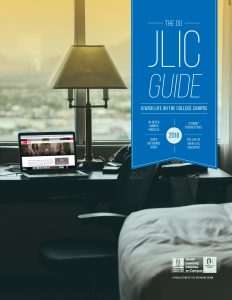 OU-JLIC College Guide Now Available
OU-JLIC College Guide Now Available
This fall, OU-JLIC released its second bi-annual College Guide, an indispensable source of information about religious life on campus. Edited by Hani Lowenstein, OU-JLIC Associate Director of Community Projects, and Simcha Himmel, OU-JLIC Logistics and Communications Associate, the Guide helps high schoolers and their parents determine which university is the best fit for them.
In addition to the updated profiles of Yeshiva University and Touro College, as well as OU-JLIC’s twenty-one campuses, the Guide also includes a checklist to use during the college research process and an expanded reference guide for Orthodox amenities on campus. But what really makes this college guide unique is that it’s a collaboration between OU-JLIC professionals, Educators on campus and the college students themselves.
“We wanted to focus on the Jewish college experience, from choosing colleges through graduation and beyond, so we have many articles written by students,” says Himmel. “These students share perspectives and advice on everything from being a student leader on campus to navigating college life as a religious Jew.”
The Guide can be purchased on Amazon.
Talking with Batya Siegel
Jewish Action spoke with Batya Siegel, a Torah Educator for Israel Free Spirit: Birthright Israel. The program features high-caliber Torah Educators, who are licensed tour guides providing historical and religious perspectives on the various sites.
How did you come to be a Torah Educator for Israel Free Spirit: Birthright Israel?
I had wanted to work for Birthright for many years, but I worried about the logistics of being a tour guide while having young children at home. But I’m so glad I did it—I get to see the results. So many participants visit the country years later and I get to see who they become; Israel truly becomes their homeland. I often hear participants say things like, “this experience changed my life forever”; it has a huge effect.
What were some meaningful moments from this past summer?
One that stands out is the Bar/Bat Mitzvah ceremony we held on the top of Masada [where participants can choose a Hebrew name and share their reflections]. One participant, Jackie Tayabji [who did not have a Jewish name], asked me if she could take on my name—Batya. Speaking about why she chose the name, she stated that Batya, the daughter of Pharaoh, stretched out her hand to save Moshe Rabbeinu, the eventual leader of the Jewish People. Jackie said she considered our trip together to be the “hand of Batya” for her own Jewish growth.
For more information about Israel Free Spirit: Birthright Israel or to apply for its year-round trips, visit israelfreespirit.com
1500+ young adults took part in the OU’s Israel Free Spirit: Birthright Israel trips this past summer, our largest summer to date.
In addition to the standard trips offered to 18 to 26-year-olds, this summer Israel Free Spirit: Birthright Israel offered three trips to participants aged 27 to 32 for the first time!
NEW POSITIONS AND PROMOTIONS
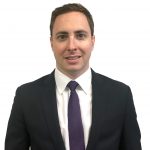 The OU’s Teach Advocacy Network welcomes Daniel Mitzner as the new Director of State Political Affairs. In this newly created role, Daniel will manage policy and community engagement and mobilization in the Network’s five regional offices (New Jersey, Florida, Pennsylvania, California and Maryland). He and his team will initiate and monitor key legislation and advocacy to further the Network’s mission. Most recently, Daniel served as Director of the Brooklyn, Queens and Staten Island Region for the American Israel Public Affairs Committee (AIPAC). He received his law degree from St. John’s University and his bachelor’s degree from the University at Buffalo where he majored in political science. A native New Yorker, he currently resides in Brooklyn.
The OU’s Teach Advocacy Network welcomes Daniel Mitzner as the new Director of State Political Affairs. In this newly created role, Daniel will manage policy and community engagement and mobilization in the Network’s five regional offices (New Jersey, Florida, Pennsylvania, California and Maryland). He and his team will initiate and monitor key legislation and advocacy to further the Network’s mission. Most recently, Daniel served as Director of the Brooklyn, Queens and Staten Island Region for the American Israel Public Affairs Committee (AIPAC). He received his law degree from St. John’s University and his bachelor’s degree from the University at Buffalo where he majored in political science. A native New Yorker, he currently resides in Brooklyn.
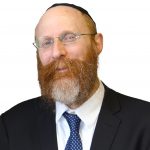 Congratulations to Yosef Kanofsky, Director of Government Programs for Teach NYS, a division of the Teach Advocacy Network, for being named to the New York State Education Department’s CAP and Mandated Services Working Group, which assists the Education Department in understanding the needs of schools that are applying for these programs. “There is no question that our work on these programs with our member schools, both from the policy angle and the application side, will bring a new vantage point to continue helping all nonpublic schools,” said Yosef.
Congratulations to Yosef Kanofsky, Director of Government Programs for Teach NYS, a division of the Teach Advocacy Network, for being named to the New York State Education Department’s CAP and Mandated Services Working Group, which assists the Education Department in understanding the needs of schools that are applying for these programs. “There is no question that our work on these programs with our member schools, both from the policy angle and the application side, will bring a new vantage point to continue helping all nonpublic schools,” said Yosef.
 A hearty welcome back to Solly Hess, who joins the OU Synagogue and Community Services Department as Regional Director of Western States. A dynamic communal professional with extensive experience in leadership development and community engagement, Solly makes his return to the OU after serving as the Major Gifts Director at Long Beach Memorial Medical Center. Solly’s previous work with the OU includes serving as Regional Director of West Coast NCSY, where he helped revitalize the West Coast Region, expand the reach of the organization’s brand, and establish a culture of fervent and active Jewish life among a diverse community of students, parents, and lay leaders. Solly received his MBA from Pepperdine University and lives in Long Beach, California, with his wife and three children.
A hearty welcome back to Solly Hess, who joins the OU Synagogue and Community Services Department as Regional Director of Western States. A dynamic communal professional with extensive experience in leadership development and community engagement, Solly makes his return to the OU after serving as the Major Gifts Director at Long Beach Memorial Medical Center. Solly’s previous work with the OU includes serving as Regional Director of West Coast NCSY, where he helped revitalize the West Coast Region, expand the reach of the organization’s brand, and establish a culture of fervent and active Jewish life among a diverse community of students, parents, and lay leaders. Solly received his MBA from Pepperdine University and lives in Long Beach, California, with his wife and three children.
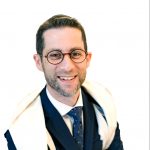 Rabbi Phil Karesh joins the OU Synagogue and Community Services Department as the Midwest Regional Director after nearly a decade as an Educator with NCSY. In his new role, Rabbi Phil spends his time partnering with communities and shuls throughout the Midwest Region to engage, strengthen and inspire the greater Jewish community. After earning a bachelor’s degree at Yeshiva University, Rabbi Phil obtained a master’s in education at Loyola University and semichah at Yeshiva University in Israel. He lives with his wife and children in Chicago.
Rabbi Phil Karesh joins the OU Synagogue and Community Services Department as the Midwest Regional Director after nearly a decade as an Educator with NCSY. In his new role, Rabbi Phil spends his time partnering with communities and shuls throughout the Midwest Region to engage, strengthen and inspire the greater Jewish community. After earning a bachelor’s degree at Yeshiva University, Rabbi Phil obtained a master’s in education at Loyola University and semichah at Yeshiva University in Israel. He lives with his wife and children in Chicago.
WOMEN IN ACTION
The OU Women’s Initiative (WI) has continued to connect with our communities throughout the yom tov season, providing women across the country with opportunities for learning and growth in the wake of the New Year. To mark the Yamim Nora’im, the WI was privileged to host Sivan Rahav-Meir, renowned journalist, author and media personality from Israel for a “Weekend of Inspiration” throughout the Shabbat Shuvah weekend. Sivan addressed over 1,500 attendees throughout her “speaker tour” in the local New York area, beginning at girls’ yeshivah high schools—Stella K. Abraham High School for Girls, Yeshiva University High School for Girls, and Shulamith High School—and continuing throughout Shabbat and Sunday in Great Neck, New York; West Hempstead, New York, Teaneck, New Jersey, and Lawrence, New York. Sivan’s unique personal and professional experiences combined with her Torah insights provided our audiences with universal messages to take with them into Yom Kippur.
The WI Scholars Program, an umbrella initiative that began Shavuot 2018/5778: Standing Together at Sinai, has been an incredible opportunity for synagogues to partner with the WI. Two additional initiatives, as part of the Scholars Program, have developed: Monthly Rosh Chodesh Virtual Lunch ‘n Learns and Simchat Torah 2018/5779: Celebrating Simchat Torah Together.
The Rosh Chodesh Virtual Lunch ‘n Learn program, featuring outstanding female Torah scholars and leaders, began in Chodesh Elul with Rabbanit Shani Taragin and continued with Rebbetzin Tzipora Weinberg in Tishrei. Both presentations were featured on Facebook and other social media outlets, ensuring easy access for participants across the country and from the comfort of their own home or workplace. Chodesh Cheshvan will feature Mrs. Rachel Kosowsky followed by Mrs. Yael Leibowitz in Kislev.
Celebrating Simchat Torah Together impacted over thirty synagogues across the US and Canada, by supporting local female scholars and educators and providing Torah learning and inspiration to women during the aliyot portion of morning services on Simchat Torah.
The WI looks forward to continuing to partner with our communities and facilitate increased opportunities for learning and growth for women. For more information regarding the WI and upcoming programs, visit ou.org/women.
FOLLOW US ON FACEBOOK! @ouwomensinitiative
ADVOCACY WRAP-UP

OU Executive Vice President Allen Fagin testified before an IRS panel this past November, where he expressed concern over proposed tax regulations. The regulations would undermine state-sponsored scholarship programs that enable thousands of students to attend Jewish day schools.
Working to Roll Back Troubling New Tax Provisions
In December 2017, Congress passed the Tax Cuts and Jobs Act, a sweeping tax law overhaul intended to reduce federal taxes and simplify the US tax code. But two provisions inside the 1,100-page document not only place unprecedented tax burdens on shuls and day schools but also threaten to undermine state-sponsored scholarships for families who wouldn’t otherwise be able to provide their children with a Jewish education.
The OU Advocacy Center is playing a leading role in the effort to repeal these tax proposals through its partnerships with faith leaders and close work with US legislators.
Limits on State and Local Tax Payments and School Choice Programs
Proposed new regulations governing K-12 student scholarships would require individual taxpayers who receive state or local tax credits for contributing to state-supported scholarship programs to reduce any charitable deduction for that contribution on their federal taxes by the amount of the state tax credit.
The State and Local Tax (SALT) provision would severely undermine the 23 tax-credit scholarship programs in 18 states that enable thousands of children to attend Jewish schools—along with more than 250,000 students enrolled nationwide in other parochial schools.
The proposed rules would particularly harm Jewish day schools and yeshivas in Pennsylvania and Florida, where 40 percent and 25 percent of Jewish day school students, respectively, receive tax credit scholarships worth more than $31 million combined.
On Nov. 5, OU Executive Vice President Allen Fagin testified in Washington, DC before a panel of IRS and US Treasury Department officials to express concern over the proposed provision, noting that providing a Jewish education is the American Jewish community’s greatest challenge.
“The adverse impact of the proposed regulations on these programs will harm thousands of students that depend upon these scholarships and their families,” said Mr. Fagin, who outlined alternatives to the proposed regulations.
“America’s houses of worship do so much for the communities in which they’re located. We need to do everything we can so that they’re supported, rather than diverted from their charitable work.”
—OU President Moishe Bane
A New Tax on Shuls and Schools
Also tucked into the far-reaching Tax Cuts and Jobs Act legislation is a section that would, for the first time, require shuls, other houses of worship and nonprofit organizations to pay federal taxes on the cost of providing certain fringe benefits to their employees, particularly parking and transportation subsidies.
Depending on how the implementing regulations are written, the new taxes would cost smaller shuls several thousand dollars, while day schools could easily be responsible for tens of thousands of dollars in new taxes.
To fight this overreaching provision, the OU Advocacy Center is helping lead a coalition that includes the US Council of Catholic Bishops, the Mormon Church and the National Association of Evangelicals as well as other nonprofit sector organizations. OU Advocacy also held meetings with key officials at the White House and the Treasury Department, and with US Representatives and Senators, who have since introduced bills to repeal the burdensome new taxes.
In the Senate, OU Advocacy has pressed for Sen. Ted Cruz’s (R-TX) Protect Charities and Houses of Worship Act and Lessening Impediments from Taxes for Charities Act introduced in the Senate by Sen. James Lankford (R-OK) and in the House by US Rep. Mark Walker (R-NC).
“This would be an unprecedented entanglement of the IRS with the operations of these religious institutions,” said OU Advocacy Center Executive Director Nathan Diament.
OU PRESS CLASSICS
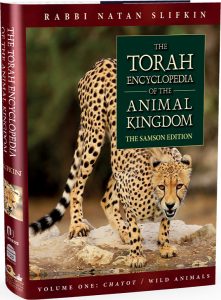 The Torah Encyclopedia of the Animal Kingdom Volume1: Chayot/Wild Animals
The Torah Encyclopedia of the Animal Kingdom Volume1: Chayot/Wild Animals
By Rabbi Natan Slifkin
OU Press, The Biblical Museum of Natural History and Maggid Books
Rabbi Natan Slifkin demonstrates why he has become acclaimed as the “Zoo Rabbi” with his book The Torah Encyclopedia of the Animal Kingdom—Volume 1: Chayot/Wild Animals. This book contains an encyclopedic array of information relating to everything from the fearsome to the fluffy: lions and leopards and bears, but also hyraxes, hares and hippopotami, and much else as well. (Note: Rabbi Slifkin argues the hippopotamus is actually the fearsome “behemoth” of Job, and as such, belongs to the former category.)
Rabbi Slifkin gathers together all Scriptural references to the animals he discusses, as well as sources from the Talmud, the Midrash and later rabbinic literature about the identity, laws, symbolism and significance of the animals in the Torah. In addition, Rabbi Slifkin combines his Torah erudition with wide-ranging knowledge of zoology and natural history, drawing on the latest academic findings to understand Torah sources. The beautiful color photographs that accompany the text evoke the words of King David: “You make darkness, and it is night: wherein all the beasts of the forest do creep forth. The young lions roar after their prey, and seek their meat from God. The sun arises, they gather themselves together, and lay them down in their dens . . . O Lord, how manifold are Your works! In wisdom You have made them all: the earth is full of Your riches.”
For anyone seeking to explore those riches from within the Jewish tradition, The Torah Encyclopedia of the Animal Kingdom is the definitive resource.
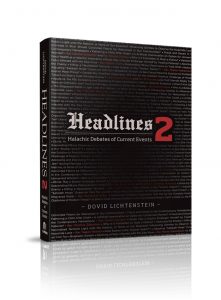 Headlines 2: Halachic Debates of Current Events
Headlines 2: Halachic Debates of Current Events
By Dovid Lichtenstein
OU Press
In Headlines 2: Halachic Debates of Current Events, Dovid Lichtenstein, an accomplished talmid chacham and prominent businessman, successfully continues the project he began in the first volume of this series—drawing on items in the news, he examines some of the most controversial issues of our times through the lens of halachah.
Each chapter begins with a news article which provides background context for the discussion, then surveys a wide gamut of halachic sources both classical and contemporary, before arriving at its conclusion. Written in clear language, each chapter contains an in-depth exploration of a modern dilemma addressed through the literature of halachah. This volume also contains interviews with a number of leading halachic experts on many of the subjects discussed.
Whether or not one agrees with the conclusions reached, each article is thought-provoking and passionately argued. Headlines 2 makes for fascinating reading for scholars and laypeople alike, and demonstrates the enduring relevance of halachah to the contested issues in our society today.
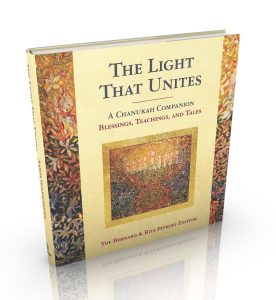 The Light That Unites: A Chanukah Companion—Blessings, Teachings, and Tales
The Light That Unites: A Chanukah Companion—Blessings, Teachings, and Tales
By Rabbi Aaron Goldscheider
Artwork by Aitana Perlmutter
OU Press
Chanukah’s light has grown brighter over time. Missing from much of the traditional canon, Chanukah has received pride of place in many later works, especially those of the great Chassidic leaders. Rabbi Aaron Goldscheider’s The Light that Unites is a significant contribution in spreading the once hidden light of Chanukah.
Consisting of inspirational teachings and stories and containing beautiful artwork, the book is divided into eight chapters comprised of thirty-six brief sections—one for each of the thirty-six Chanukah candles. Each of the eight chapters focuses on one of eight major themes of Chanukah identified by Rabbi Goldscheider: peace, love, family, heroism, miracles, hope, unity and holiness. In addition, the book contains a detailed commentary on the blessings and songs surrounding the candle lighting ceremony, and a section of insights into Birkat Hamazon and the customs of Chanukah.
The teachings contained in the book come from a wide range of Jewish leaders and thinkers, spanning the generations. In these pages, the reader encounters the insights of the Chofetz Chaim, Rabbi Avraham Yitzchak HaKohen Kook, the Lubavitcher Rebbe, and Rav Joseph B. Soloveitchik, alongside tales of Chassidic leaders recounted by Rabbi Shlomo Carlebach, and many more luminaries from the distant past to the present.

